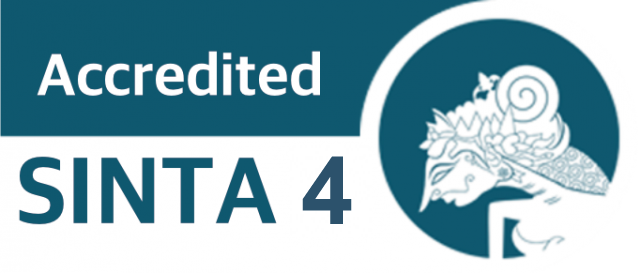Meningkatkan Kemampuan Wawancara Melalui Dialog Imajinatif dengan Tokoh Idola Siswa SMA Negeri 1 Binjai
Abstract
Communicating is something that is absolutely necessary every individual. By communicating life will be easy. With a lot of communicating, then something will be lighter weight. With a lot of difficulty communicating anyway everything will be easily overcome. Interview is part of the communication activities. In order of social life, the interview is not new anymore. Formally, the interview will be required every time someone entering the workforce. However, any converse informally also frequently experience. With many questions to the speaker, it will be easy established good relations. So it is clear that the interview, both formal and informal, will be able to foster self-confidence of an individual. Presumably because it was also the government through the Ministry of Education put learning materials in the curriculum converse Indonesian language and literature classes X and XI SMA Negeri 1 Binjai. This means that students really prepared for a lot of interviewing, as their stock when completed high school, or in simpler language students are encouraged to practice communicating. On this basis, researchers are trying to develop a learning technique called: Improving interview skills through imaginative dialogue with student idol. Learning with imaginative dialogue is done by presenting the students idolize figures in their imagination, as well as imaginative dialogue with the idol. Having tried out in a classroom action research (classroom action research) in three cycles, then this study proved very successful. Acquisition value of the average student is very good, which is 82.8 on one cycle, 81.8 on two cycles, and 85.95 on the ketiga.Karena cycle anyway, this learning is very good and suitable for use anywhere, regardless of space and of time, because each student (every human being) must have its own idol who is usually the person who admired.
Keywords
Full Text:
PDFReferences
AM, Sardiman. 2007. Interaksi dan Motivasi Belajar Mengajar. Jakarta: Raja Grafindo Persada.
Aqib, Zainal, Dkk. 2009. Penelitian Tindakan Kelas. Bandung: Yrama Widya.
Arikunto, Suharsimi. 1999. Prosedur Penelitian. Jakarta: Rineka Cipta.
Arikunto, Suharsimi Dkk. 2006. Penelitian Tindakan Kelas. Jakarta: Bumi Aksara
Asrori, Muham
mad. 2007. Penelitian Tindakan Kelas. Bandung: Wacana Prima.
Arikunto, Suharsimi Dkk. 2006. Penelitian Tindakan Kelas. Jakarta: Bumi Aksara
Budingsih, S.Asri. 2005. Belajar dan Pembelajaran. Jakarta: Rineka Cipta.
Denny, Richard. 2006. Communicate to Win (Kiat Komunikasi yang Efektif dan Impresif). Jakarta. Gramedia Pustaka Utama.
Depdiknas. 2002. Kamus Besar Bahasa Indonesia. Jakarta: Balai Pustaka.
Depdiknas. 2003. Kurikulum Berbasis Kompetensi. Jakarta: Depdiknas.
Depdiknas. 2003. Undang-Undang Republik Indonesia Nomor 20 Tahun 2003 tentang Sistem Pendidikan Nasional. Jakarta: Depdiknas.
Gani, Rizanur. 1988. Pengajaran Sastra Indonesia Respon dan Analisis. Jakarta: Dian Dinamika Press.
Ismail, Taufik. 2003. Agar Anak Bangsa Tak Rabun Membaca Tak Pincang Mengarang (Pidato Penganugerahan Gelar Kehormatan Doctor Honoris Causa di Bidang Pendidikan Sastra. Yogyakarta: Universitas Negeri Yogyakarta
Khatib, Yusran. 1999. Prosedur Penilaian. Padang: IKIP Padang.
Kompas. 2006. UN Juga Berarti Ujian untuk Sekelurga Artikel. Dalam Kompas edisi 9 Juli 2006. Jakarta: PT Kompas Media Nusantara.
Mahayana, Maman S. 2008. Bahasa Indonesia Kreatif Jakarta: Penaku.
Marahimin, Ismail. 2001. Menulis Secara Populer. Jakarta: Pustaka Jaya.
Murthado, Ali. 2007. Menulis di Surat Kabar Gampang. Medan: Wal Ashry.
Semi, M.Atar. 1990. Rancangan Pengajaran Bahasa dan Sastra Indonesia. Bandung:Angkasa.
Ramlan, M. 1993. Paragraf, Alur Pikiran dan Kepaduannya dalam Bahasa Indonesia. Yogyakarta: Andi Offset.
Sanjaya, H. Wina. 2010. Strategi Pembelajaran Berorientasi Standar Proses Pendidikan. Jakarta: Kencana.
DOI: https://doi.org/10.26499/mm.v12i1.1021
Refbacks
- There are currently no refbacks.



